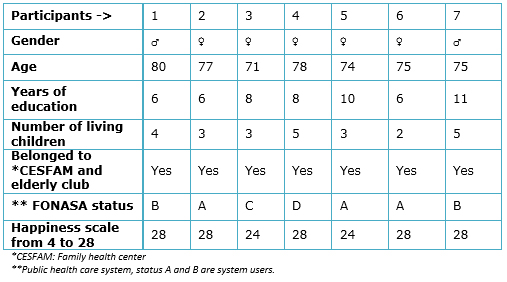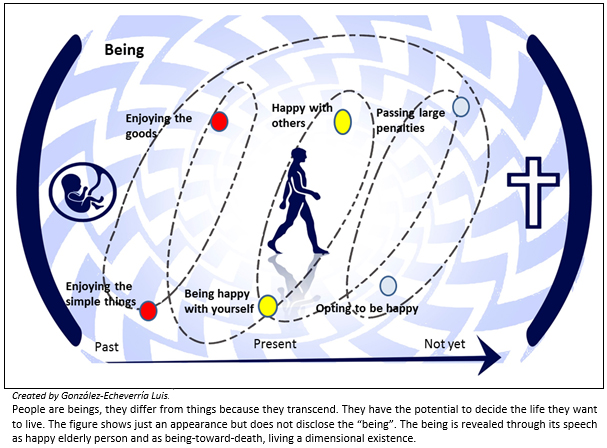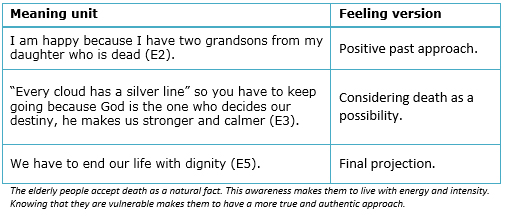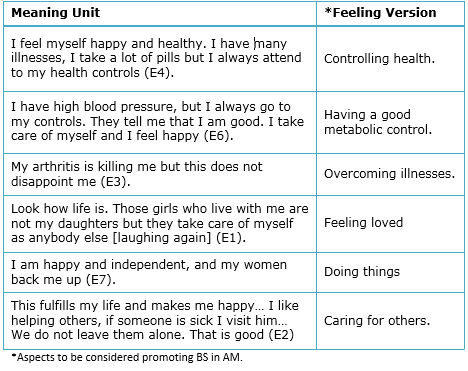Qualitative studies
← vista completaPublished on October 12, 2016 | http://doi.org/10.5867/medwave.2016.09.6574
The happy elderly as a being-toward-death: a phenomenological research
El adulto mayor feliz, como ser-para-la-muerte: estudio fenomenológico
Abstract
INTRODUCTION Little research has been done on elderly adults from an optimistic perspective. What is it like to be a happy elderly person who is moving toward death? How can we approach their health promotion? This study aimed at exploring ways of being happy in older adults in Chile.
METHODS We used a phenomenological approach, using Martin Heidegger’s philosophical frame. Participants were chosen after applying the Lyubomirski scale – those who fell into the “happy” category were invited to a semi-structured interview.
RESULTS We identified categories in happy elderly people; such as being autonomous, traveling, dancing, childcare, reading, pets, enjoy material goods. Thus, being able to understand the happy elderly person as being placed in the world without any choice other than accepting life and death as best as possible, with an optimistic regard about the past, an ability to reinvent themselves, and an awareness of being closer to death.
CONCLUSIONS There is still not enough knowledge available about the psychological resources that promote a welfare state in old age in juxtaposition with the losses at this stage of life. Studies show that happiness levels in older adults are very good, albeit in a context of high concentration of emotional and material losses, and the imminence of death. Unlike the common standpoint that conceives older adults within a biomedical framework, we believe it is necessary to promote an ontological understanding of old age; that is to say an understanding beyond bodily conditions, which includes the meaning of life experiences, and happiness as a tool for active and healthy aging.
Introduction
Chile as a country whose population is becoming old [1],[2],[3],[4], has high rates of economic and social inequalities. Many authors point out that, because of the population is growing, it is mandatory to do research not only about issues regarding morbidity, risk factors and elderly chronic diseases but aimed to positive ageing with a subsequent subjective positive well-being, thus improving their quality of life [5],[6],[7],[8].
Martin Heidegger (philosophical referent and philosopher of care) discloses the idea that there is a possibility to live a true life without fear. Such a life is possible when old people accept their death as something that will come true (after death comes life, so if death comes I leave this world).
Assuming that death is coming, Heidegger indicates “la Sorge” (being care). well-being should be an issue and therefore, knowing that death is coming, life should be our priority. Death, thus, gives a true meaning to our existence. As a result, death is linked with happiness. The human being as a “being” is described as ontological “Dusein” (existence). This “being” is a project that has been thrown into the world. This “being” has to take care of himself and has to try to live well [9].
Several researchers have concluded that the subjective well-being perception, quality of life, vital satisfaction and social well-being are related with happiness. These concepts acquire an ontological status through the clarification of the concept and its capacity to be measured [10],[11],[12],[13]. They state happiness is based on: positive cognitive value of life, subjective well-being perception [14],[15], optimism [16], happiness [17],[18] and especially what is called the flow state [19].
Happiness has three different basic dimensions: one focused in emotional-affective aspects, another in cognitive-value aspects and the third related with the need to have an affiliation and social interaction. In this line, they conclude that psychological well-being “is not just to be happy forever, but living the process and accepting life as it comes. People do not have to avoid pain but on the contrary, they have to face it, giving it in this way a useful meaning, transforming pain into something beautiful and worth of living ” [14].
Lyubomirsky, who is a referent of different authors indicates that “happy elderly people are successful when they perform and are involved in different activities. They see themselves happy, because they have incomes, friends, jobs and health. They, at the same time, make better decisions, adjust to the change and overcome the failure with a different approach” [11],[12],[13],[14],[15],[20],[21].
Another aspect to be considered is that, according with some researches, happiness improves physiological and health aspects [22],[23]. The effect of happiness is not just reflected in medical treatment results but in the better perception that patients have over the health care system [24]. People of different ages that are more independent and have more motivations, have as a consequence a better health and a better subjective well-being perception [25]. Physical activity seems to have a vital role in the subjective well-being perception, especially in women [26],[27].
It is important to emphasize that according to a study made in Israel with elderly women [28], the elderly economic conditions are closely related to how they perceive their own well-being. Another study mentions that the crucial aspects to have a good perception of the subjective well-being are: enjoying the communication with others, having relations with meaningful people and enjoying freedom when living in society. On the other hand when they live in deprived neighborhoods, they have a poor subjective well-being perception, which makes necessary to create stronger belonging bonds and mutual support [29],[30].
According with some studies, happiness in Latin America depends upon its developing situation. For this reason, it is mandatory that old people get a good income, universal health insurance, better housing and good infrastructure [13],[31]. Different authors worked in Chile and Argentina in 2010 and 2013, using a psychometric subjective happiness scale (Lyubomirsky and Lepper). They found a meeting point with other measurements [11],[32].
In Chile around 57% of elderly people have mates, including those married and those who live together. Between those people 60% are house owners who have an average income of 125 dollars, corresponding to the pension system, being this payment very low. Between elderly people 11.8% live alone and 85.3% own their houses [2]. Considering all of the above, the following questions arise. What is it like to be a happy elderly person, knowing that death is coming? And what aspects should be considered about health promotion? Considering all of the above, the happy elderly people were considered from a phenomenological approach. The objective was to find out features related with the way of life those adults follow, knowing that they will die.
Methods
This study used a qualitative research and a phenomenological approach. The seven participants belonged to an elderly organization from San Ramon District, Metropolitan Region. The subjects were selected according to convenience and to being the highest scores in accordance with the Subjective Happiness Scale (Lybomirsky). This scale was validated in Chile by Pablo Vera Villarroel, Karen Celis Atenas and Natalia Cordoba Rubio [11].
The criteria to select the subjects were: to be 65 years old or more, to be in a good physical condition, to have a sound mind and to be able to answer the questions. A phenomenological interview was applied using a guideline. Some examples of the questions were the following: What is happiness for you? How have you been happy in your life? Are you happy with your family? Are you happy with your neighbors and community? Can you give me an example?
An ethic confidentiality agreement was saved. The research was approved by the Ethics Committee of the School of Nursing that belongs to Diego Portales University. All the participants were part of the public health care system.
What the seven subjects answered had many common topics, therefore they conveyed a similar message. Once the analysis was made and the interviews were written on paper, the whole process was tested with meaning units. These results helped to build categories related with “the happy elderly as a being-toward-death” and “caring” (la sorge).
As a theoretical triangulation these categories were analyzed by each author one by one, in the light of the bibliography and with the happiness perception measured by Lyubomirsky (see discussion).
Finally, as a summary, it is presented “la epoje”. Here, there is no judgment, the life of the happy elderly is placed in parentheses. We neither affirm nor deny anything about him. The researcher remains as a spectator, he is not involved. It is a resting mental state. In phenomenology, the reduction is a process in which all data, convictions, etcetera, are placed in parenthesis. According to Husserl, the Phenomenological Reduction Method allows to discover an unknown new experience [33],[34]. The results of this study are considered unequivocal because they are real answers expressed by the participants. Meaning units are expressed in the text as the initial E followed by the number of the person interviewed.
Results
Upon applying the Lyubomirsky happiness scale it was possible to identify seven happy elderly people. All of them belonged to an elderly organization, they were part of the public health care system and had two or more children. They did not finish high school. The number of women and men were not the same (Table 1).
 Full size
Full size The following categories for a happy elderly were identified: being independent, travelling, dancing, raising children, having pets, enjoying of assets. In this way elderly people were able to have a good time. These results confirm what the Heidegger philosophy states about the happy elderly as a being-toward-death. Old people should have a good time and end their days with dignity (E5). As a being-toward-death, the subject is always brave, so he/she is waiting as if he/she should assume a crucial role, having a positive perception of the past, feeling happy with life, living day by day, having faith in God, feeling happy with his or herself and deciding to be happy (Table 2, Figure 1).
 Full size
Full size  Full size
Full size From an ontological perspective the happy elderly will lose inevitably all their meaningful folks, leaving eventually this world themselves. Their relation with ethics and comprehension of life and death will rescue them from loneliness. Taking care of others “My children are part of myself, I have a good husband, and he is a good father… That is happiness… I think in myself (E4).
They know that they have to take care of themselves, “I take care of myself and because of that I feel happy” (E1). The fact that happy elderly people take care of themselves allow them to be aware of their vulnerability, giving them the possibility to be authentic and true in front of others who need help.
The phenomenology teaches that living a practical life gives the possibility to create meaningful relationships. This awareness allows them to be more authentic in the way they interact with others (Table 3). La fusorge (taking care of others), allows a moral development, being this a necessity as well: fighting against loneliness, being important for others and performing acts of love. All of the above make their own existence happier as a being-toward-death.
 Full size
Full size Summarizing, this happy elderly as a being-toward-death is placed in parenthesis because this analysis does not intend to make a judgment and is not seeking causes and effects (Figure 1). According to Merleau Ponty, it is the person himself/herself who lives his/her destiny [35]. In this world the body is just an illusion. The happy elderly has been thrown into the world and at the beginning they do what the society wants them to do. They, however, evolve becoming someone more independent and free to make choices because they are being-toward-death.
The human being life evolves synchronously. Therefore, happy elderly people are fit in this world and are in connection with others. They live in this time but at the same time are part of a simultaneous and total time. They enjoy of assets and enjoy living a simple life. They are happy with others and with themselves. They are not immune to pain but they decide to be happy. The elderly thrown into the world is constantly evolving and is past, present and future. The being-toward-death is selbtsorgen (taking care of themselves); fusorgen (taking care of others) and besorgen (taking care of things). All these characteristics are aimed to be happy and end with dignity [36],[37].
Discussion
Seligman, states that happiness is equally to genetics plus life circumstances plus willingness control [38]. Lyubormirsky points out that genetics cannot be modified and is 50% of happiness. On the other hand, life circumstances (example: poverty, richness, fatness, thinness), correspond to 10% and willingness control represents 40% [39]. Therefore there are two areas to be modified: life circumstances and willingness control.
This investigation focus in this 40% of happiness that depends upon the willingness to do things. Because of, the happy elderly lives within this world and belongs to this world, it is crucial that he/she keeps busy and active. The categories exposed before indicate about this statement, however not all elderlies are happy. Not everybody has either personal tools or a positive experience of the past to live a good life.
This investigation is trying to answer two questions. The first is: How is it like to be a happy elderly knowing that death is coming? The answer is given by Heidegger: the elderly is happy when he/she is authentic and takes care of himself/herself, knowing that death is coming, so he/she has to live well [36]. The second is: What are the aspects to be considered regarding health? According with different analyses, it is very important that elderlies have independence and opportunities to make their own decisions. They also need social protection and well-being. This corresponds to the 10% indicated by Lyubormirsky.
In contrast with the happiness related with socio economic levels [13],[28],[31], Thumala indicates that despite of a population increasingly old, there is not enough knowledge about psychological resources that promote a well-being state for elderlies. In this stage, where the losses of meaningful people are a fact, it is very important to have a sound mind as well as knowing how to deal with this issue. Paradoxically, there are many researches that indicate that in this life stage, elderlies are happier. This discovery is described as the “happy elderly paradox”. Different studies show that in this stage happiness levels are very good even though this stage has many losses. The elderlies here also see death as something that is coming sooner than later and that is why we have the paradox [40].
For elderlies, depression and exercise were triggering factors related with the subjective well-being perception as well as cognitive-functions [41]. Other studies showed that chronic diseases were vital for the well-being perception. Social support and the satisfaction of participating in different activities had a positive impact in the subjective well-being perception [27],[42],[43].
Experts recommend to diagnose the well-being perception locally. In this way, they will acknowledge their needs and they will be able to incorporate policies, guaranties and universal health insurance to promote and improve the well-being satisfaction [24],[31],[44]. Health care professionals in primary care must comprehend about all components regarding elderly well-being, thus moving further in decreasing inequalities and improving their satisfaction [24]. They will be then, an objective contribution in promoting health in the decade 2011-2020.
This investigation supports the task of working with elderlies, seeking mental health, working with their personal skills, promoting their independence and helping them to decide to be happy and in this way converting the death that is coming into an opportunity to be more authentic and happier. The happy elderlies have probed that “the death” is not a threat for happiness but an opportunity.
Conclusion
Biomedical studies of the elderly in Chile have focused mainly in functionality. Therefore, an ontological approach in connection with what the society offers as: health, insurances, housing and community life is mandatory. All these factors promote the elderly well-being.
Health care professionals should not underestimate the elderlies´ happiness. They need to observe them from a biomedical perspective but at the same time they must promote the subjective well-being as a tool for an active and healthy ageing process, beginning with the ontological understanding of the mechanisms that lead to happiness.
Notes
From the editor
The authors originally submitted this article in Spanish and subsequently translated it into English. The Journal has not copyedited this version.
Ethical aspects
The Journal is aware that the research ethics committee of the Faculty of Health and Dentistry, School of Nursing of Diego Portales University, Santiago, Chile, knew about this study and its possible publication in a journal of biomedical diffusion.
Conflicts of interest
The authors completed the ICMJE conflict of interest declaration form, translated to Spanish by Medwave, and declare not having received funding for the preparation of this report, not having any financial relationships with organizations that could have interests in the published article in the last three years, and not having other relations or activities that might influence the article´s content. Forms can be requested to the responsible author or the editorial direction of the Journal.
Funding
The authors declare that there was no funding coming from external sources.

